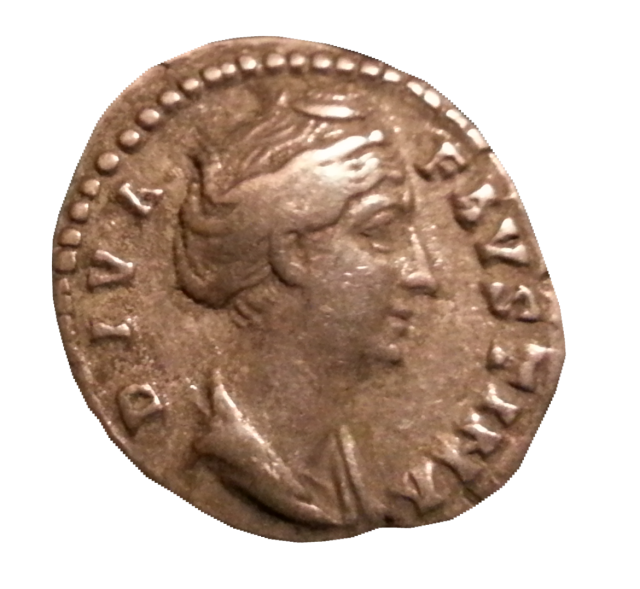…or, why everything in Wikipedia needs to be rigorously fact-checked!
Readers may recall a post I made not too long ago on the subject of the divine Faustina Major, who during her all-too-brief life was Augusta, wife of the divine Antoninus Pius, mother of four children, granddaughter of the divine Matidia, and so forth and so on. After death, she became the focus of the most concerted cult of a diua—in some ways, since Livia (a.k.a. Julia Augusta)—in other ways, ever. (Which is not to say that the cult of the divine Sabina, Plotina, and so on was stinting.)

What prompted that post and a series of reflections about the divine Faustina, including four or five books out of the library, many prayers, and the purchase of an ancient Roman coin struck in her honour (see illustration) … anyway, what got the ball rolling with this for me was the observance of September 21 as her birthday.
I’m going to skip ahead to the big reveal—
SPOILER ALERT
September 21 is probably not her birthday. I spotted this today in Barbara Levick’s Faustina I and II, which I’ve been reading through and which I actually would have said until this afternoon was disappointingly thin on facts that were new to me. The birthday of the divine Faustina is more likely to be February 16—the day after Lupercalia and the day before Quirinalia. For this, Levick cites the authority of the Feriale Duranum, which would be strong enough—actually, I can’t find the smoking gun in the Feriale Duranum, but I do find 16 February (ante diem XIII Kalendas Martias) given as natalis Faustinae uxoris Antonini in a 5th-century calendar (Inscriptiones Italiae 13-02, 43).
You might recall me saying I’d gotten a feeling from the divine Faustina on September 21 along the lines of “Yo, learn more about me”. On the one hand, I think I really was meant to learn more about her in general—her many associations with Ceres, including the ‘fast of Ceres’ observed on 20 October—her cult attributes—details of her career as both empress and goddess … yet on the other hand, there might also have been something more specific going on: “Dude, this isn’t my birthday. It’s my daughter’s.” And of course, the birth of a child inevitably is an important occasion in a parent’s life—still, it’s not in fact one’s own birthday. (Usually!)
So I wanted to hasten to point out this mistake and to admit where it came from. I got the September 21 date from Wikipedia, and I should have been wary of it, not so much because it was on Wikipedia but because there was no source given for it there. Evidently I never got around to fact-checking this.
Still, at least the English-language Wikipedia article on Faustina the Elder has improved dramatically since I started taking an interest in her—which may or may not be a total coincidence. Compare, for example, the article as it appeared last summer with how it appears today. Many yummy footnotes! Just sayin’.

Very important updates, and a point well-taken on the dangers of following the trails of the wikipedes. They have some info on certain figures that I had not found elsewhere, but I have also not checked up on, which I should thus probably do, too…e.g. the death-date of Diva Matidia, which (if the wikipedes are not misleading us this time!) is coming up later this month. We know her birthdate, certainly, but I hadn’t been aware that her death-date had been narrowed down until I saw the Wikipedia article on her sometime in the last year…